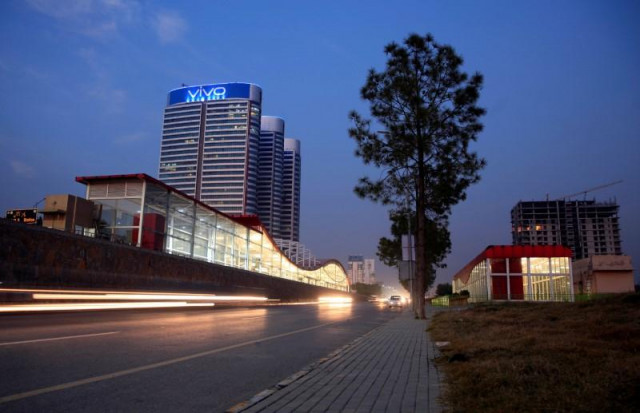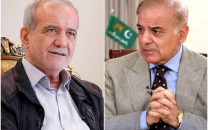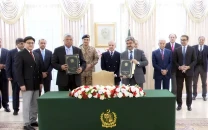What if we really become a good economy?
In developed economy, no quick bucks will be made and elite culture will diminish

FILE PHOTO: Vehicles run past the Centaurus mall in Islamabad, Pakistan November 23, 2017. REUTERS/Faisal Mahmood
This omnipresence of economics in daily-life discussion has forced politicians to re-design their rhetoric in terms of political issues. All this has created a monomaniac focus on economic issues in Pakistan and this is actually a blessing.
No one would have imagined a few years ago that a common man would be using the figures of economic indicators – inflation and current account deficit along with daily slangs.
However, this focus on economic issues has cascaded the nation’s energies on improving the economy. But what if we really become successful in becoming a good economy? Do we have the imagination to visualise how things would be? Would all be hunky-dory? I bet not.
One of the most intellectually enriched poets of our heritage can help understand the issue at hand. Ghalib in one of his verses said: “Latafat be kasafat jalwa paida kar nahi sakti… (Everything good accompanies something bad inevitably).
Yes it’s true. The present government has become successful in controlling the current account deficit. It has declined from $19 billion in FY18 to $2.8 billion so far in FY20.
If the carry-trade investments are included in the equation, the dollars coming in are greater than the dollars going out of Pakistan. This is nothing but magical. But all this magic is accompanied by the inevitable costs of inflation, unemployment and decline in economic growth.
So what would our little world look like when we become a good economy? How would the indicators change? How would it impact the daily life? The developed world has certain characteristics and we might not like all those very much. However, if we enter that world, we would have to embrace them all.
If Pakistan becomes a developed economy, its per capita income would increase, income inequalities would decline and income distribution would be more equitable. Average age would increase and hence the dependency ratio would increase. Infant mortality rates would decline, population would generally become healthier and roads would become cleaner.
The national economy would witness a transition from the primary-sector agrarian economy to a service-oriented economy with a sizeable manufacturing sector.
Along with all the above advantages, the not-so-attractive features of development will also be witnessed. Investment in real estate will not double in two to three years, as has been witnessed previously.
The exorbitant returns offered by the real estate were a result of parking black money in the sector and not genuine demand.
Back in April 2017, I wrote an article in this newspaper titled “Property boom is here but is it here forever?”
I compared Karachi with other metropolitan cities including Mumbai, Dubai, Shanghai and Hong Kong and hence presented an analysis that real estate in Karachi is overpriced and the bust in this boom cycle is inevitable.
I received criticism at that point in time, however, problems are now being witnessed in the real estate sector. In developed economies, such quick bucks are impossible.
Similarly, I wrote several times that the stock market is overpriced with price-to-earnings multiples as high as 30 times. I have met so many people with all their savings invested in the market and they say the market will continue to go up and breach the 60,000 level. And all of us our witnessing the real story.
Developing vs developed
The point to ponder is this. A major difference between developed and developing economies is the asymmetry of information. As the economies move from the developing to developed status, the asymmetry of information reduces and the knowledge becomes ubiquitous.
When this happens, the chances for making quick money diminish at least in conventional sectors.
As is seen in the developed world, most of the people live in similar standard houses. They get similar levels of healthcare facilities and most of them enjoy similar living standards. The elite culture diminishes with development. This is not a good news for the elite.
Pakistan’s economy is functioning on the pivot of elitism so much so that veteran economist and administrative expert Dr Ishrat Husain has titled his book “Pakistan - the economy of an elitist state”. Having drivers and servants would be extremely difficult for the elite in the developed Pakistan economy.
At this point, an image of Istanbul tram comes to my mind wherein the rich and the poor travel together. Is Pakistan’s elite ready to do that?
Development is a goal worth striving for. But it must be kept in mind that it would make lives slightly boring. No quick bucks would be made and not many people would be able to change their status over time at least in conventional sectors.
The real question of development is pointed towards the elite. Are they ready?
The writer is a corporate banker and teaches economics
Published in The Express Tribune, March 16th, 2020.
Like Business on Facebook, follow @TribuneBiz on Twitter to stay informed and join in the conversation.



















COMMENTS
Comments are moderated and generally will be posted if they are on-topic and not abusive.
For more information, please see our Comments FAQ